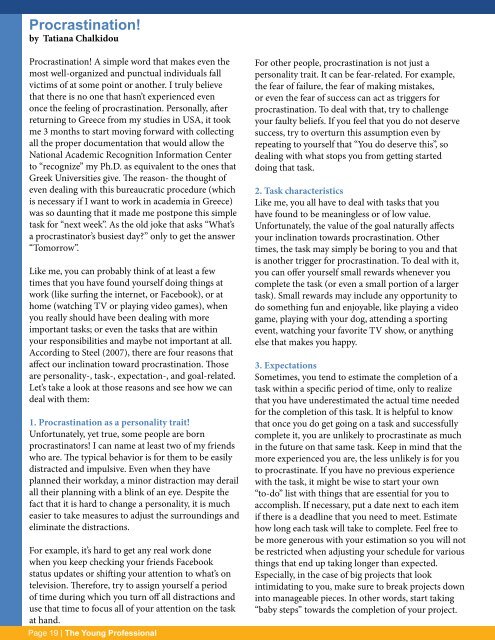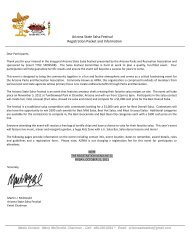The Young Professional 1 - Arizona Parks and Recreation Association
The Young Professional 1 - Arizona Parks and Recreation Association
The Young Professional 1 - Arizona Parks and Recreation Association
Create successful ePaper yourself
Turn your PDF publications into a flip-book with our unique Google optimized e-Paper software.
Procrastination!by Tatiana ChalkidouProcrastination! A simple word that makes even themost well-organized <strong>and</strong> punctual individuals fallvictims of at some point or another. I truly believethat there is no one that hasn’t experienced evenonce the feeling of procrastination. Personally, afterreturning to Greece from my studies in USA, it tookme 3 months to start moving forward with collectingall the proper documentation that would allow theNational Academic Recognition Information Centerto “recognize” my Ph.D. as equivalent to the ones thatGreek Universities give. <strong>The</strong> reason- the thought ofeven dealing with this bureaucratic procedure (whichis necessary if I want to work in academia in Greece)was so daunting that it made me postpone this simpletask for “next week”. As the old joke that asks “What’sa procrastinator’s busiest day?” only to get the answer“Tomorrow”.Like me, you can probably think of at least a fewtimes that you have found yourself doing things atwork (like surfing the internet, or Facebook), or athome (watching TV or playing video games), whenyou really should have been dealing with moreimportant tasks; or even the tasks that are withinyour responsibilities <strong>and</strong> maybe not important at all.According to Steel (2007), there are four reasons thataffect our inclination toward procrastination. Thoseare personality-, task-, expectation-, <strong>and</strong> goal-related.Let’s take a look at those reasons <strong>and</strong> see how we c<strong>and</strong>eal with them:1. Procrastination as a personality trait!Unfortunately, yet true, some people are bornprocrastinators! I can name at least two of my friendswho are. <strong>The</strong> typical behavior is for them to be easilydistracted <strong>and</strong> impulsive. Even when they haveplanned their workday, a minor distraction may derailall their planning with a blink of an eye. Despite thefact that it is hard to change a personality, it is mucheasier to take measures to adjust the surroundings <strong>and</strong>eliminate the distractions.For example, it’s hard to get any real work donewhen you keep checking your friends Facebookstatus updates or shifting your attention to what’s ontelevision. <strong>The</strong>refore, try to assign yourself a periodof time during which you turn off all distractions <strong>and</strong>use that time to focus all of your attention on the taskat h<strong>and</strong>.Page 19 | <strong>The</strong> <strong>Young</strong> <strong>Professional</strong>For other people, procrastination is not just apersonality trait. It can be fear-related. For example,the fear of failure, the fear of making mistakes,or even the fear of success can act as triggers forprocrastination. To deal with that, try to challengeyour faulty beliefs. If you feel that you do not deservesuccess, try to overturn this assumption even byrepeating to yourself that “You do deserve this”, sodealing with what stops you from getting starteddoing that task.2. Task characteristicsLike me, you all have to deal with tasks that youhave found to be meaningless or of low value.Unfortunately, the value of the goal naturally affectsyour inclination towards procrastination. Othertimes, the task may simply be boring to you <strong>and</strong> thatis another trigger for procrastination. To deal with it,you can offer yourself small rewards whenever youcomplete the task (or even a small portion of a largertask). Small rewards may include any opportunity todo something fun <strong>and</strong> enjoyable, like playing a videogame, playing with your dog, attending a sportingevent, watching your favorite TV show, or anythingelse that makes you happy.3. ExpectationsSometimes, you tend to estimate the completion of atask within a specific period of time, only to realizethat you have underestimated the actual time neededfor the completion of this task. It is helpful to knowthat once you do get going on a task <strong>and</strong> successfullycomplete it, you are unlikely to procrastinate as muchin the future on that same task. Keep in mind that themore experienced you are, the less unlikely is for youto procrastinate. If you have no previous experiencewith the task, it might be wise to start your own“to-do” list with things that are essential for you toaccomplish. If necessary, put a date next to each itemif there is a deadline that you need to meet. Estimatehow long each task will take to complete. Feel free tobe more generous with your estimation so you will notbe restricted when adjusting your schedule for variousthings that end up taking longer than expected.Especially, in the case of big projects that lookintimidating to you, make sure to break projects downinto manageable pieces. In other words, start taking“baby steps” towards the completion of your project.










